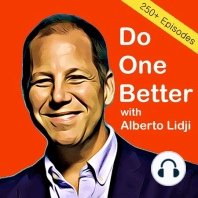38 min listen

President and CEO of World Vision International, Andrew Morley, talks about their work in supporting the most vulnerable children across 100 countries…
FromDo One Better with Alberto Lidji in Philanthropy, Sustainability and Social Entrepreneurship
President and CEO of World Vision International, Andrew Morley, talks about their work in supporting the most vulnerable children across 100 countries…
FromDo One Better with Alberto Lidji in Philanthropy, Sustainability and Social Entrepreneurship
ratings:
Length:
37 minutes
Released:
Dec 6, 2020
Format:
Podcast episode
Description
In 2020, they are celebrating their 70th birthday. World Vision International operates in most countries across the world and is a $3 billion organisation focused on ending violence against children in all its forms and supporting children, particularly in some of the most challenging countries, such as the DRC and Syria.
While World Vision is a Christian organisation, they serve those of all faiths and of no faith at all. They’re structured globally by setting up separate legal entities in the countries where they operate (such as World Vision South Africa) — these entities all agree to work in partnership with all the other World Vision entities around the world. They also work with delivery partners in local settings. Many of World Vision’s in-country team leaders come up from local communities, as opposed to being expats placed there from overseas.
Andrew sheds light on World Vision International’s funding. Their primary funding is derived through their child sponsorship model. This is a model that aims to develop communities — not just the individual child but also the communities where that child lives.
Since they are a $3 billion organisation, they are fortunate in having adequate resources to withstand a shock such as that posed by COVID-19. Part of the reason why their funding streams are robust is the strong link between sponsors and the children and communities where these children live.
We also hear of Andrew’s career trajectory. He started off in the private sector and only later on in life moved into the non-profit world. He was always selling things from an early stage in his childhood and, then, also as a teenager. The idea of marketing was something he was passionate about. Then, at 30, he had a powerful coming to faith moment and felt a calling to become a Christian. His life turned around at that point. At the time he was working for Sky TV as sales and marketing director — he recalls how back then he was the youngest executive on their Management Board.
He stayed in the corporate world for 20 years, spending time at high profile organisations, such as Google and Motorola Mobility. In 2017, he was ordained as an Anglican Vicar in St Paul’s Cathedral. Now, alongside his work at World Vision International, on Sunday mornings Andrew serves at a London church called Holy Trinity Brompton. He loves combining the two.
We hear how transitioning from the corporate world to the non-profit world is not that straight forward. The remuneration is much different and in the non-profit world everything is about excellence at a minimum cost, while in the corporate world it is about excellence at an acceptable cost. In the non-profit world, funding decisions often impact whether a child goes hungry or not. Andrew advises the audience: if you feel pulled towards the non-profit world, then go ahead and give it a try.
One of the major programmes at World Vision is focused on ending violence against children. Andrew notes how lockdown and COVID-19 have meant that children are at home more, and they’re away from the protective environment of school and are often not given access to the adults who might protect them. So, the risk of violence against children is exacerbated.
When asked what success for the next 10 years looks like to him, Andrew answers that he’d love to see an end of extreme poverty in all its forms by 2030. He’s optimistic and explains that despite the backwards steps in economic indicators due to COVID-19, what we’ve also learned from this pandemic is that when people come together and have a common goal that we can achieve lots. He’d also like to see an end of violence against children in all its forms and have World Vision play its part in making that happen.
Andrew’s key takeaway: Think about how your life is having an impact on the world, and ask yourself what you want your legacy to be. Most of us want to have a legacy that makes the world better in some way, so think about how
Released:
Dec 6, 2020
Format:
Podcast episode
Titles in the series (100)
British Ambassador Designate to South Sudan, Chris Trott, joins Alberto Lidji to discuss conflict resolution, power sharing agreements, Ebola and working in the frontlines: British Ambassador Designate to South Sudan, Chris Trott, joins Alberto Lidji to discuss conflict resolution, power sharing agreements, Ebola and working in the frontlines. Chris talks about his career trajectory and the rewarding challenges of being p... by Do One Better with Alberto Lidji in Philanthropy, Sustainability and Social Entrepreneurship